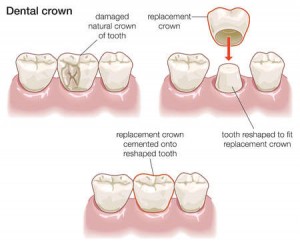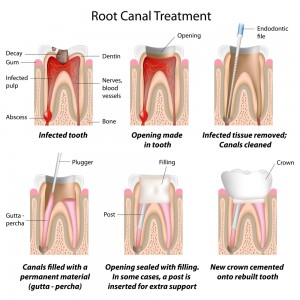- Home
- About Us
- Procedures
-
Cosmetic DentistryRestorative DentistryOrthodonticsPediatric Dentistry
-
- Patient Info
- Gallery
-
-
Services
- FAQ
- Contact Us
- Promotions
Call us at: 281-336-0095

Root Canal and Crown Services
A crown is a type of dental restoration that fully cups over that portion of a tooth or dental implant that lies at and above the gum line.
 Once placed, it in effect becomes the tooth’s new outer surface. In comparison, a dental filling just fills in or repairs a portion of a tooth.
Once placed, it in effect becomes the tooth’s new outer surface. In comparison, a dental filling just fills in or repairs a portion of a tooth.
Dental crowns are permanently cemented into place. The tooth-crown unit that results is cared for and functions like any natural tooth.
Dental porcelain can be sculpted to closely replicate the look of natural tooth enamel, while providing desirable strength and resilience. Porcelain crowns are an excellent choice when recreating the form and function of a damaged tooth, because a crown basically replaces the entire external portion of the tooth down to the gum level. Crowns are not limited to simply replacing the original tooth, but can be designed to create an even better esthetic appearance.
Dr. Stephen is an expert of Root canal treatment and crowns. Call US to find out of you need one – 281 206 4444
Why Crown?
There are a several different reasons why a dental crown might be made for a tooth. Dentists routinely use them to Repair and strengthen damaged teeth or Improve the appearance of teeth (including color, shape and even apparent alignment).
We recommend Crowns for
|
What is a Root Canal ?
Dental Root canal treatment is done when decay will likely damage or has already killed a tooth.
During a root canal, we removes the pulp from the center of a tooth and fills the pulp cavity.
This can prevent the development of a painful infection in the pulp that may spread to other teeth.
A root canal can also treat an infection that has developed into an abscessed tooth. This procedure can relieve toothache, stop infection, and promote healing.
|
The tooth may be fitted with a temporary crown until the permanent crown is made and cemented into place.
What To Expect After Surgery
After a root canal, your lips and gums may remain numb for a few hours until the anesthetic wears off. Later you may have throbbing pain, which you can treat with pain medicines, such as ibuprofen, acetaminophen, or a stronger prescription painkiller. Be safe with medicines. Read and follow all instructions on the label. The pain usually lasts only a day or two.
Crowns that seal the top of the tooth and strengthen it may come loose over time. They may need to be repaired, redone, or cemented on again







